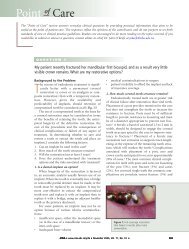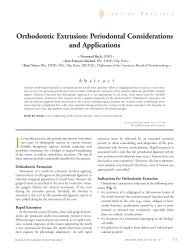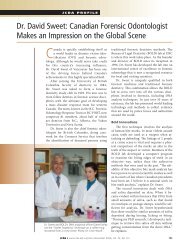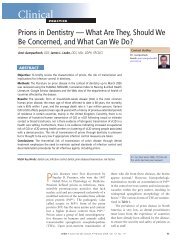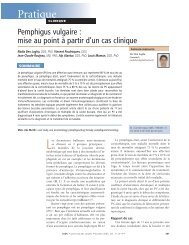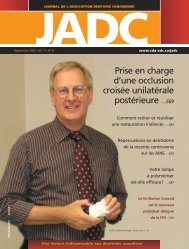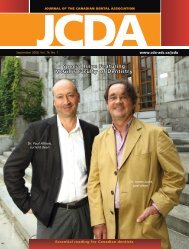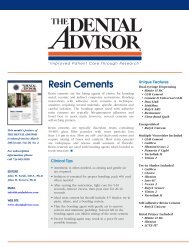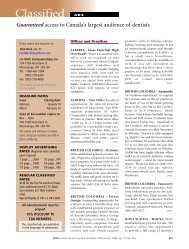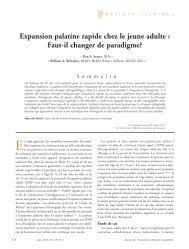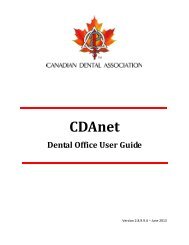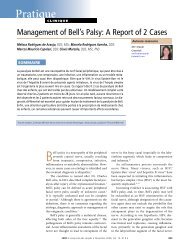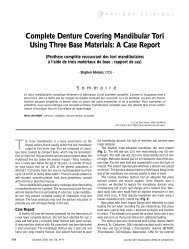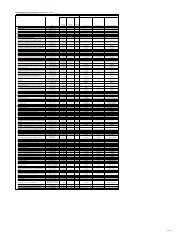JCDA - Canadian Dental Association
JCDA - Canadian Dental Association
JCDA - Canadian Dental Association
Create successful ePaper yourself
Turn your PDF publications into a flip-book with our unique Google optimized e-Paper software.
Guideline for<br />
Treatment of acute apical abscess in adults<br />
This guideline has been developed by the CCCD and was approved by the Council of the CCCD on<br />
September 3, 2003. The full version of the guideline and methods used in its development are available at<br />
http://www.cccd.ca. Clinical Practice Guidelines are systematically developed statements to assist practitioners<br />
and patients in making appropriate oral health care decisions for specific clinical circumstances.<br />
They should be used as an adjunct to sound clinical decision making. CCCD guidelines are updated on a<br />
regular basis as new research information becomes available.<br />
Goal<br />
This guideline is intended to aid clinicians in<br />
ensuring pain relief for patients with acute apical<br />
abscesses.<br />
Definition<br />
An acute apical abscess is a periapical inflammation<br />
resulting from an untreated, non-vital pulp.<br />
Features of Acute Abscess<br />
■ Tooth is non-vital<br />
■ Pain:<br />
■ Rapid onset<br />
■ From slight tenderness to intense,<br />
throbbing pain<br />
■ Marked pain to biting or percussion<br />
■ Swelling:<br />
■ Palpable, fluctuant<br />
■ May be a localized sense of fullness<br />
■ Radiographic Changes:<br />
■ None to large periapical radiolucency<br />
Recommendations<br />
■ In the case of localized and diffuse abscesses,<br />
drainage should be started as soon as possible.<br />
This may include non-surgical endodontic<br />
treatment (root canal therapy), incision and<br />
drainage or extraction, depending upon the<br />
Journal of the <strong>Canadian</strong> <strong>Dental</strong> <strong>Association</strong><br />
clinican’s judgement and taking into account<br />
the patient’s preferences.<br />
■ If immediate drainage is not possible, appropriate<br />
analgesia (NSAIDs) should be recommended<br />
until the infection can be adequately<br />
drained.<br />
■ Systemic antibiotics provide no additional<br />
benefit over drainage of the abscess in the case<br />
of localized infections.<br />
■ In the presence of systemic complications (fever,<br />
lymphadenopathy, cellulitis), diffuse swelling or<br />
a patient with medical indications, antibiotics<br />
may be a helpful addition. There is no evidence<br />
to recommend one antibiotic over another in<br />
the management of acute abscesses with<br />
systemic complications.<br />
■ Antibiotic therapy may be indicated when<br />
drainage cannot be achieved.<br />
■ Patients should be given the appropriate dose<br />
of analgesics (NSAIDs if not contra-indicated)<br />
pre-operatively, and/or immediately postoperatively.<br />
This should be continued as needed<br />
to control pain.<br />
Not recommended<br />
■ Antibiotic therapy is not indicated in otherwise<br />
healthy patients.<br />
■ Antibiotic therapy is not indicated when the<br />
abscess is localized.<br />
November 2003, Vol. 69, No. 10 661



